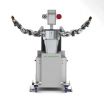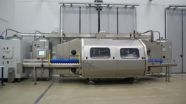(Press-News.org) Although it is the third most frequent cause of death in Germany, blood poisoning is frequently underestimated. In this country, 60,000 persons die every year from some form of sepsis, almost as many as from heart attacks. The Sepsis Nexus of Expertise states that patients arriving at the intensive care ward with blood poisoning only have a 50% chance of surviving. One of the reasons for the high mortality rate is the fact that patients are not correctly treated due to late diagnosis. The doctor and the patient used to have to wait as much as 48 hours for the laboratory analysis.
In future, a new mobile diagnostics platform will be guaranteeing fast and low-cost infection diagnostics even while the patient is being transported to the hospital. It's called MinoLab and it consists of a plastic card the size of a credit card that is inserted in an analysis unit that is smaller than a notebook. This system provides findings in less than one hour to enable the doctor to prescribe the life-saving therapy. This is based on magnetic particles that dock onto the cells to be studied in a blood sample and run through the system fully automatically with magnetic force. At the end of the process, the diagnosis is made with magnetic sensors. MinoLab is presently being developed in a project of the German Federal Ministry of Education and Research by the Fraunhofer Institute for Cell Therapy and Immunology (IZI) in Leipzig, Germany in collaboration with Magna Diagnostics, a company hived off from the Fraunhofer Society. Other project partners are the Fraunhofer Institute for Reliability and Microintegration (IZM) in Berlin as well as the companies Siemens, Dice, microfluidic Chip Shop and the Austrian Institute of Technology.
Dr. Dirk Kuhlmeier, a scientist at the Fraunhofer Institute for Cell Therapy and Immunology, explains how all that works: "After taking a sample of blood, magnetic nanoparticles bind themselves to the target cells in the blood sample through specific catcher molecules. We then use a simple magnet to transfer the particles onto the plastic card along with the pathogens and move them through various miniaturized reaction chambers which is where the polymerase chain reaction takes place. This is a method for copying even the smallest DNA sequences of pathogens millions of times. After it is copied, the nanoparticles transport the pathogen DNA into the detection chamber where a new type of magnetoresistive biochip can identify pathogens and antibiotics resistances." Our researcher goes on: "All reactions starting from sample preparation through isolating the target molecules right down to documentation are carried out without any contact and fully automatically." This means that routine operation is made much simpler for the laboratory technician and it reduces the risk of contamination from bacteria introduced from the environment that set off false alarms. But there is another benefit, as Dr. Kuhlmeier explains: "We not only save time with the combination of magnetic nanoparticles in a new type of micro-fluid. Miniaturization means we also save expensive apparatuses."
The experts have already been successful at using magnetic nanoparticles to isolate and document the sepsis pathogens, although Kuhlmeier says, "it will be another two years or so until we are able to produce a prototype of the diagnostic platform." Platform technology is not only suited for sepsis tests. It will be able to back up doctors in hospitals and private practices answering a wide range of molecular biological issues ranging from genetic predisposition right down to cancer diagnostics.
INFORMATION:
Fast sepsis test can save lives
2010-12-23
ELSE PRESS RELEASES FROM THIS DATE:
Why do risks with human characteristics make powerful consumers feel lucky?
2010-12-23
People who feel powerful are more likely to believe they can beat cancer if it's described in human terms, according to new study in the Journal of Consumer Research.
The study looks at anthropomorphism, or the tendency to attribute humanlike characteristics, intentions, and behavior to nonhuman objects. "The present research shows important downstream consequences of anthropomorphism that go beyond simple liking of products with humanlike physical features," write authors Sara Kim and Ann L. McGill (both University of Chicago).
Previous consumer research has already ...
Does equality increase status spending?
2010-12-23
People are happier when goods are more equally distributed, but equality makes people want to spend more to get ahead of their neighbors, according to a new study in the Journal of Consumer Research.
Authors Nailya Ordabayeva (Erasmus University, The Netherlands) and Pierre Chandon (INSEAD, France) examined the way equality influences the consumption decisions of people in the bottom tiers of social groups. The researchers found that increasing equality decreases bottom-tier consumer envy of what other people have and boosts their satisfaction with their possessions. ...
Love-smitten consumers will do anything for their cars and guns
2010-12-23
The way people treat their possessions looks like love, according to a new study in the Journal of Consumer Research.
"Is it possible for consumers to be in love with their possessions?" ask authors John L. Lastovicka (Arizona State University) and Nancy J. Sirianni (Texas Christian University). When it comes to cars, computers, bicycles, and firearms, the answer seems to be a resounding yes.
The researchers visited five car shows in Arizona and conducted in-depth interviews with car enthusiasts (males and females, aged 19-68). They found that love-smitten consumers ...
Climbing Mount Everest: Noble adventure or selfish pursuit?
2010-12-23
Adventure seekers are plunking down more than $50,000 to climb Mount Everest, but a new study in the Journal of Consumer Research finds that people who pay for transformative experiences often lack the communitarian spirit that usually defines such activities.
"In order to escape the rules, contraptions, and stresses of daily life in the city, many people search for new and liberating experiences that transcend their normal bureaucratic and corporate existence," write authors Gülnur Tumbat (San Francisco State University) and Russell W. Belk (York University). However, ...
Why must we compensate after buying gifts that threaten our identities?
2010-12-23
If a vegetarian has to buy a steakhouse gift certificate for a friend, her discomfort will lead her to buy something else that reaffirms her identity, according to a new study in the Journal of Consumer Research.
"When gift givers choose a gift that matches the identity of the recipient but is contrary to their own identity, they experience discomfort," write authors Morgan K. Ward (Southern Methodist University) and Susan M. Broniarczyk (University of Texas). This discomfort leads consumers to choose other products that express their identities.
The authors investigated ...
A robot with finger-tip sensitivity
2010-12-23
Picture the following: With great care, a robot picks up a gear wheel in one hand, a housing in the other, and places the two together. When they don't immediately engage, it breaks off its movement. Slowly, it twists the gear wheel round a little and tries again. This time the wheel slots easily into its mounting. The robot smiles, and places the correctly assembled part on the conveyor belt. The pi4-workerbot is capable of making many more movements than a normal robot and is the jewel in the crown of the EU-funded PISA research project, which aims to introduce greater ...
New Year's Eve tip from American Chemical Society journal: Pour champagne down the side of the glass
2010-12-23
WASHINGTON, Dec. 22, 2010 — Just in time for New Year's Eve, and the arrival of the International Year of Chemistry, a study may settle that long-standing disagreement over the best way to pour a glass of champagne: Scientists in France are reporting that pouring bubbly in an angled, down-the-side way is best for preserving its taste and fizz.
The study also reports the first scientific evidence confirming the importance of chilling champagne before serving to enhance its taste. They reported in the American Chemical Society's Journal of Agricultural and Food Chemistry. ...
Research shows positive results with high pressure technology for certain dairy products
2010-12-23
The AZTI-Tecnalia technological centre, in a project undertaken by the Tecnolat and Llet de Catalunya dairy product companies within the FUTURAL project, has verified that, as an alternative to the traditional heat treatment for decontamination of a number of dairy products, high pressure technology is highly recommendable. In fact, according to a press release from Tecnolat, the results, especially with ready-to-eat fruit products and in the inactivation of moulds and yeasts in other dairy products, "were highly positive and promising".
The research and trials carried ...
Emerging drug class may enhance red blood cell production in anemic patients
2010-12-23
FINDINGS: By determining how corticosteroids act to increase production of red blood cell progenitors, Whitehead Institute researchers have identified a class of drugs that may be beneficial in treating some erythropoietin-resistant anemias. One such anemia is Diamond-Blackfan anemia (DBA), which is frequently treated with corticosteroids, despite their severe side-effects. The identified class of drugs may be able to treat other anemias, including those resulting from trauma, sepsis, malaria, kidney dialysis, and chemotherapy.
RELEVANCE: Some common anemias can be treated ...
Researchers discover genetic predisposition for breast, kidney cancers
2010-12-23
Researchers at Cleveland Clinic's Genomic Medicine Institute have revealed multiple genetic discoveries that may permit easier diagnosis and disease management for Cowden syndrome patients who are predisposed to breast and kidney cancer.
The research, which could allow for earlier discovery of cancerous tumors, is published in the Dec. 22 issue of the Journal of the American Medical Association (JAMA).
Charis Eng, M.D., Ph.D, Chair of the Genomic Medicine Institute at Cleveland Clinic, led the research. It revealed KILLIN as a novel predisposition gene for Cowden ...


